 Petzlover
Petzlover Keeshond is originated from Netherlands but Sloughi is originated from Morocco. Keeshond may grow 24 cm / 9 inches shorter than Sloughi. Keeshond may weigh 10 kg / 22 pounds lesser than Sloughi. Both Keeshond and Sloughi has almost same life span. Both Keeshond and Sloughi has almost same litter size. Keeshond requires Moderate Maintenance. But Sloughi requires Low Maintenance
Keeshond is originated from Netherlands but Sloughi is originated from Morocco. Keeshond may grow 24 cm / 9 inches shorter than Sloughi. Keeshond may weigh 10 kg / 22 pounds lesser than Sloughi. Both Keeshond and Sloughi has almost same life span. Both Keeshond and Sloughi has almost same litter size. Keeshond requires Moderate Maintenance. But Sloughi requires Low Maintenance
 Keeshond is the term used for German Spitzes and although many American references have it that the Keeshond originated in the Netherlands, some say the dog originated in Germany and is a member of the German Spitz family.
Keeshond is the term used for German Spitzes and although many American references have it that the Keeshond originated in the Netherlands, some say the dog originated in Germany and is a member of the German Spitz family.
The Club for German Spitzes was founded in 1899. The Nederlandse Keeshond Club was formed in 1924. The Keeshond is also referred to as ‘The Smiling Dutchman’.
It was in the 17th and 18th centuries that the Keeshond was used greatly as a watchdog, appearing in England in the late 1800s, but after the turn of the 20th century, Mrs. Wingfield Digby of Dorset, England and Mrs. Alice Gatacre, a Dutch breed authority, living in England, stirred interest in the breed with their kennels.
An English breed Club was formed in 1926, and the first Keeshond was registered with The American Kennel Club in 1930.
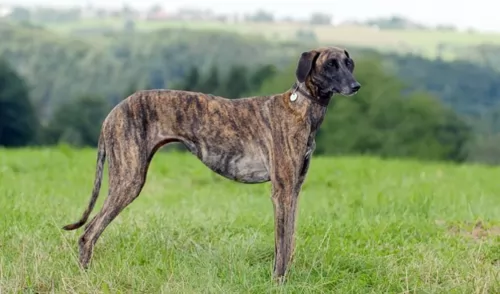 The Sloughi is an ancient dog breed, dating back to the 13th century, and coming from Morocco, North Africa.
The Sloughi is an ancient dog breed, dating back to the 13th century, and coming from Morocco, North Africa.
Much of its history isn’t well known. The dog is a member of the sighthound family. They were originally used for hunting purposes.
The world wars saw their numbers declining. The first Sloughi dog was introduced to the United States in 1973. It was in 1989 that the American Sloughi Association was founded. The dog was also recognized by the American Kennel Club as a Foundation Stock Service breed in 1997. The dog has also been recognized by FCI in the Sighthounds group.
They are rare in the United States and if you wanted to buy one of these dogs you would stand a better chance of looking for a breeder, and then there may be a waiting list.
 The Keeshond is a medium-sized dog and a member of the Spitz group of dogs. He stands at 43 – 48cm in height and weighs 14 – 18kg.
The Keeshond is a medium-sized dog and a member of the Spitz group of dogs. He stands at 43 – 48cm in height and weighs 14 – 18kg.
He has a 2-layered, dense coat which is fairly long, straight and coarse and colors are grey, silver, black and cream. His undercoat is a very light cream color. He has erect ears, a fairly shop muzzle and a feathery, plumed tail which curves over his back.
The hair on his legs is fairly short accompanied with some feathering. A typical marking-feature of the Keeshond is the dark line which runs from the outer corner of each eye to the lower corner of each ear. It's what gives the dog his well known keeshond expression. The eyes of the dog are dark brown.
The Keeshond, just like other Spitz dogs, are playful, affectionate, friendly and eager to please. He is intelligent too and will respond well to training and socialization.
He makes a wonderful family pet as he is friendly and playful with children, loving all their games. He gets on well with other pets too. He is a social dog, thriving on being with his human family, wanting to participate in all family activities.
They are sensitive, loving pets and become very attached to their owners. They have even been used as comfort dogs in rescue situations, as they bond so well with people.
He makes a good watchdog too with his loud bark which he uses to deter intruders. He may well be a good watch- and guard dog but he isn't an aggressive dog.
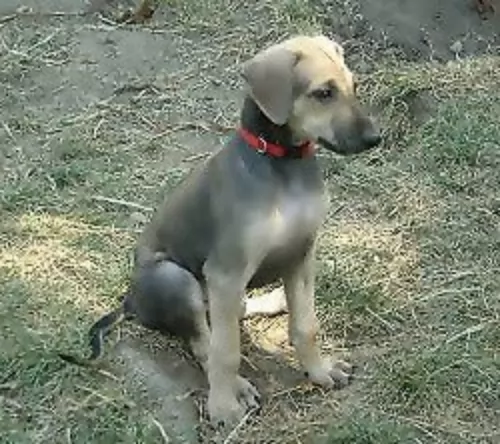 The Sloughi is a big dog, tall and slender. The head is also long and elegant. He stands between 61 and 72cm, both male and female, and he weighs in the region of 18 to 28kg.
The Sloughi is a big dog, tall and slender. The head is also long and elegant. He stands between 61 and 72cm, both male and female, and he weighs in the region of 18 to 28kg.
Looking much like a large Greyhound, the leggy dog has a noble look about him. Known for his hunting skills, he is fast and agile. In fact he is nicknamed the ‘Arabian Greyhound’.
The short straight hair makes him always look well groomed and clean. He sheds moderately throughout the year. Colors of the coat can be a fawn color, sandy, reddish brown or brindle and some come with the black mask and others without. He has medium length floppy ears and a long tail
The Sloughi loves his human family but is essentially a one-person dog. He is affectionate and loyal but can be quite stubborn, Having him trained and socialized does wonders and makes him amicable and well mannered.
He is quiet and intelligent and would prefer to be in a family with older children, and particularly with children who have been taught how to be kind and respectful with animals.
 The Keeshond, with his thick double coat, loves to be outdoors in cool weather. He won't be there too long however, because he will be missing his human family. He is such a social dog, craving human company and therefore isn't a dog to be put out in the backyard and left day after day.
The Keeshond, with his thick double coat, loves to be outdoors in cool weather. He won't be there too long however, because he will be missing his human family. He is such a social dog, craving human company and therefore isn't a dog to be put out in the backyard and left day after day.
He loves games and being totally involved with his human family. Look after your Keeshond well – he is a companion dog - and you will find him to be a most exceptional friend of yours.
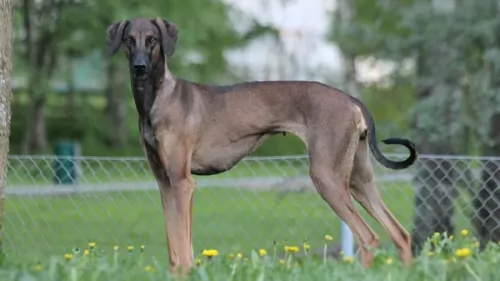 Sloughis are independent, strong willed dogs who will need a firm owner who is consistent, fair and firm.
Sloughis are independent, strong willed dogs who will need a firm owner who is consistent, fair and firm.
They're tall, slender dogs, elegant to look at and low maintenance with their short coats.
They are calm and dignified and when you make one of them your friend, companion and pet, you’re going to enjoy years of devoted companionship and loyalty.
 With good food, fresh water, exercise and lots of interaction with your Keeshond, he can reach 12 to 14 years of age.
With good food, fresh water, exercise and lots of interaction with your Keeshond, he can reach 12 to 14 years of age.
No matter how healthy your dog is, he can still get ill, but the chances are less likely when he is feed nutritionally. Nonetheless look out for hip dysplasia, bloat, ear infections, skin rashes and eye diseases.
This is a problem in the lens of the eye. Your dog has a cloudy look to the eye. A cataract can occur when the cells are damaged. A disease such as diabetes can also cause a cataract and high blood sugar levels can change the metabolism of the cells in the lens.
The lens should be crystal clear, but with a cataract, the vision of the dog is obscured. It can cause blindness. Thankfully, cataracts aren't painful and most times dogs with cataracts can still see. There is the option of surgery to remove them too.
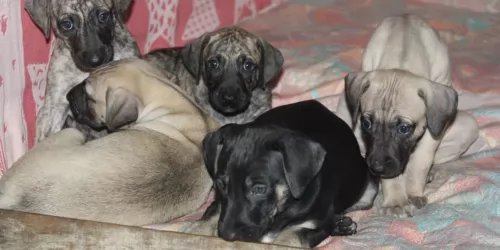 Only a few genetic conditions are found in this breed and these can be the likes of autoimmune disorders such as eye disease, Addison's disease and irritable bowel syndrome.
Only a few genetic conditions are found in this breed and these can be the likes of autoimmune disorders such as eye disease, Addison's disease and irritable bowel syndrome.
These dogs are also sensitive to anesthesia as well as some medications. Other illnesses to look out for with this large dog are cancer, bloat and diabetes.
 With his double coat, your Keeshond will need regular brushing to get rid of all those loose hairs. He is a dog which doesn't have that typical dog odor about him so bathing him is discouraged. Too much bathing irritates a dog's skin and dries it out.
With his double coat, your Keeshond will need regular brushing to get rid of all those loose hairs. He is a dog which doesn't have that typical dog odor about him so bathing him is discouraged. Too much bathing irritates a dog's skin and dries it out.
Check the inside of his mouth and make sure that his teeth are in a healthy state. If you are unsure, speak to your vet about dental hygiene as bad teeth won't only cause pain and discomfort for your pet, the teeth can affect his immune system and other body parts.
Check his claws too and have them cut when they become too long. When they are long they can hook on things and injure the sensitive area of the paws.
The Keeshond is a sturdy dog, loving all the activities and games that his family are involved in. He will love to be your walking companion and looks forward to his walk every day.
He is such a playful, adventurous dog and is always willing to join you in new games. Never put him in your back garden and forget about him, as this will make him ill and depressed. He must be part of the family to be healthy and happy and relies on you to include him in all your activities. He can live in the city or the countryside but will require being exercised wherever he is.
Top quality dry kibble will work for your Keeshond. If you want to keep him bright eyed and bushy tailed, mix in some quality home-made food too such as cooked chicken, rice and vegetables. You can also try to sometimes include a little bit of raw meat as well.
He is an active dog and will need a diet high in protein. Also, his thick coat needs to be maintained, and apart from regular brushing, look for quality dog foods that have Omega-3 fatty acids in them so as to maintain the skin and coat of the dog. Make sure he always has access to fresh, cool water.
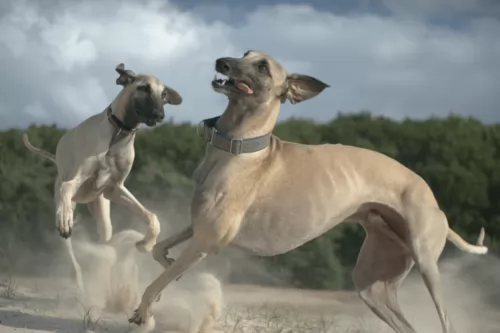 The Sloughi's coat is short and smooth and he also doesn’t have an undercoat. He is looked upon as low maintenance as he just needs a good brush every now and then to rid the coat of loose hairs and to keep him nice and shiny.
The Sloughi's coat is short and smooth and he also doesn’t have an undercoat. He is looked upon as low maintenance as he just needs a good brush every now and then to rid the coat of loose hairs and to keep him nice and shiny.
The Sloughi dog can be fed dry kibble, but it should be a top quality one – one for large, athletic dogs. The dry kibble is useful in that it helps to keep his teeth clean.
To add some tasty variety to your pet’s diet feed him some home made food occasionally. All chopped up, boiled chicken, brown rice or pasta and spinach, sweet potatoes and carrots are a healthy choice for your Sloughi and can be added to the dry kibble. Simple food like this keeps digestive problems at bay.
Try and include some raw meat into the diet as this can help in fighting off horrible skin diseases. Make sure he has constant access to fresh, cool water.
Sloughis love to be active and to have a good run. If you live near a park, allow him off the leash to have a chance to run. Alwys check first though, that it is safe to do so and that your loughi doesn’t try and fight with other dogs off the leashh or accidentally knock over a small child. If you’ve got a big garden, throw a frisbee or ball for him. It is important for him to get a good dose of exercise.